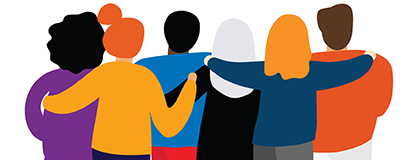
It’s been nearly two years since amputee support groups largely went virtual in response to COVID. But even though you can now connect from anywhere in the country via your laptop or phone, a surprisingly high percentage of amputees still feel isolated. Half the respondents in a recent survey said they don’t belong to an amputee group—but wish they did.
“That doesn’t surprise me,” says Leslie Green, who hosts multiple amputee communities for Hanger Clinics. “I’m surprised the number’s not bigger.” “I’m not shocked by it at all,” agrees Molly Null, longtime leader of Action Amputee Group. “I hear it all the time.”
Melissa DeChellis, who heads up Adaptively Abled Amputees, says many people are too overwhelmed to participate during the initial adjustment phase. “They learn to adapt the best they can,” she says, “but by the time they’ve established their new normal, they’ve lost whatever information they received about support groups”—if they received any in the first place.
Digital platforms have helped Green, Null, and DeChellis expand their communities, but thousands of people still seek to connect. All three leaders still recruit tirelessly, and they rely on current members to help. Whether you’re looking for a group or already belong to one, here’s what you can do to bring unaffiliated amputees into the fold.
If you belong to a group:
Share your expertise. Null has a designated tech troubleshooter to assist the digitally challenged. If you have expertise in financial planning, travel, fitness, mental health, or anything else, let people know. Amputees join (and stick with) groups that offer solutions.
Celebrate diversity. People feel welcome in crowds that include people of similar outlook. If you’re a person of color, rural resident, or non-native English speaker, invite someone from your community. Ditto if you’re a cancer survivor, person with diabetes, or senior citizen.
Tell your clinicians. If you’re happy with your group, let your care team know—from your surgeon and prosthetist to your primary care doc, pharmacist, yoga instructor, or anyone else who might interact with other amputees.
If you’re looking for a group:
The Amputee Coalition’s searchable list of support groups is a great place to start. But you should also:
Think “resource community.” Green avoids the term support group. “People want to feel independent and strong,” she says. “‘Support group’ connotes weakness or neediness. We don’t just discuss problems. We build personal relationships and empower people.”
Ask your clinicians. Solicit recommendations from your prosthetist, physical therapist, social worker, and other practitioners. Better yet, ask other amputees you meet in the waiting room or parking lot.
Shop around. You have lots of options, so take your time and do some browsing. Green encourages first-time attendees to leave their camera and microphone off, as a low-pressure way to test the waters.



